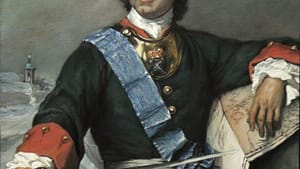Stay in the Loop
BSR publishes on a weekly schedule, with an email newsletter every Wednesday and Thursday morning. There’s no paywall, and subscribing is always free.
What’s wrong with this analogy?
Putin vs. Peter the Great

“Mr. Putin is a tough guy,” wrote John H. Bickford of Walhalla, S.C. to the New York Times last week. “He is a product of the Soviet K.G.B. and envisions himself as a modern-day Peter the Great.”
“Putin thinks in the context of Peter the Great,” Senator Robert Menendez of New Jersey, chair of the Senate Foreign Relations Committee, told CNN in February. “Why was Peter great? Because he added more territory to the Russian empire."
“He goes to bed at night thinking of Peter the Great, and he wakes up thinking of Stalin,” House Intelligence Committee chair Mike Rogers of Michigan told Meet the Press in March.
“He is following the traditional, expansionist Russian policy of Peter the Great,” Cornell history professor Barry Strauss told the Washington Times in March.
“Like his hero, Peter the Great, he tamed the new nobility (of wealth) and consolidated the power of the state,” wrote Ralph Peters in the Washington Post in 2011.
“Putin has a picture of Emperor Peter the Great in his office, and he is probably one of his most important sources of inspiration,” wrote Carlos Alberto Montaner on RealClearPolitics in 2008.
Praise for Roosevelt
You can forgive these pundits for concluding that a Russian ruler who publicly rides bare-chested on horseback may harbor secret fantasies of restoring his country’s past imperial glory. But something tells me we are in the realm of the blind men and the elephant here. I can think of two flaws in these mutually reinforcing analogies between Russia’s president Vladimir Putin and the Russian Tsar Peter the Great (1672-1725).
First, as far as I can tell after exhaustive Googling, Putin has never cited Peter the Great as a role model. On the contrary, Putin has said that his role model is neither Peter nor any of Russia's past leaders, but the American president Franklin D. Roosevelt, who rescued his country from a great depression and laid the foundations for a new era of prosperity.
But let us suppose that, deep down, Putin really does fancy himself the second coming of Peter the Great. It’s true that Peter vastly expanded Russian territory, as Putin seems eager to do. It’s also true that Peter, like Putin, consolidated the power of the Russian state and ruthlessly suppressed his rivals. But on one key issue — their attitude toward the West — Putin and Peter are polar opposites.
Learning from Europe
Peter admired and envied the West. He sought to modernize Russia by emulating Europe. When he found the Asian and Orthodox traditions too deeply entrenched in Moscow, he created a new capital, St. Petersburg. There he invited European advisers, scientists, painters, architects, scholars, and army experts en masse to help him root out old prejudices and align Russia with the achievements of the European renaissance. He modernized the Russian alphabet, introduced the Julian calendar, and established the first Russian newspaper.
(The best source, for my money, is Robert Massie’s 1981 biography, Peter the Great: His Life and World.)
Putin, by contrast, sees the West as a source of decadent values that he must reverse. His crusade against homosexuals and artists, including Pussy Riot and Pyotr Pavlensky, as well as his touting of “Russian values” as superior to Western ones exhibit a fundamental authoritarian belief that a strong leader is needed to keep the nation pure and save it from the harmful influence of Western culture.
It may be true that Putin has a picture of Peter the Great in his office. It’s also true that I have a picture of Andrew Jackson in my office. But it doesn’t necessarily follow that I favor fighting duels, closing banks, and pushing Native Americans west of the Mississippi. I also have a picture of Abraham Lincoln on my office wall, which doesn’t necessarily mean that I support suspending the writ of habeas corpus. Each of us picks and chooses among the preferred virtues of our heroes.
Whatever his failings — not the least of which was impatience — Peter the Great was driven above all by admiration for the West; Putin is driven by resentment of the West. To paraphrase Lloyd Bentsen’s reply to Dan Quayle during the 1988 vice-presidential debate: We in the West knew Peter the Great. Peter the Great was a friend of ours. Mr. Putin, you’re no Peter the Great.
Sign up for our newsletter
All of the week's new articles, all in one place. Sign up for the free weekly BSR newsletters, and don't miss a conversation.

 Dan Rottenberg
Dan Rottenberg